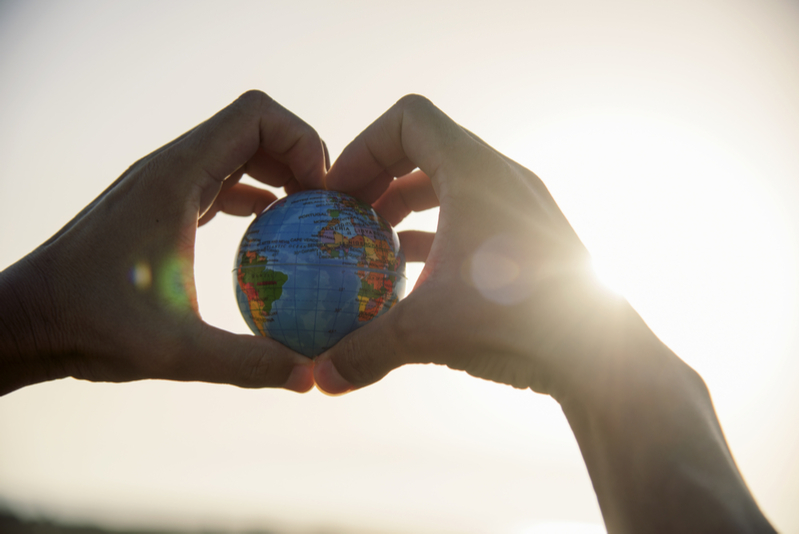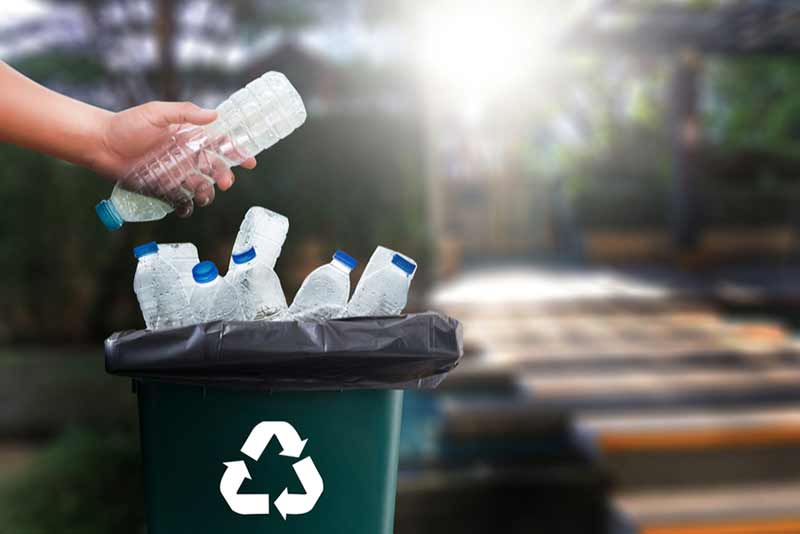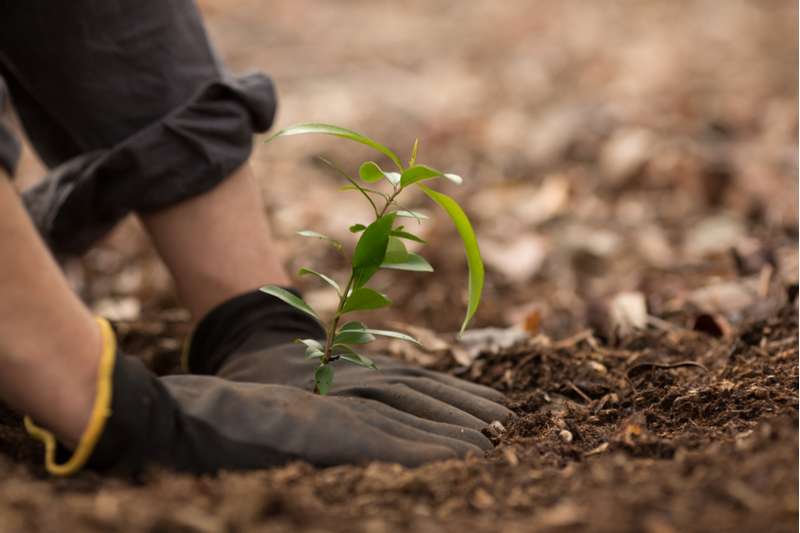Love thy planet this Valentine’s Day
Forget the typical soppy card, bouquet of roses and box of chocolates; this Valentine’s Day, challenge yourself to do something a little different by showing some love to something that really needs it; our Earth. With environmental issues making up 4 of the 5 top risks impacting the world in 2019, according to the latest WEF Global Risks Report, it’s time to get serious about reducing our carbon footprint.

There’s no time like the present to start making positive changes
As a business, you should be setting a positive example for your customers and staff to follow, whether you start small or have the means to go completely ‘green’. ‘Failure of climate change mitigation’ was ranked as the second biggest risk to our world in WEF’s report, followed by ‘extreme weather events’, ‘water crises’ and ‘earthquakes, tsunamis and other natural disasters’. Fortunately, there are steps we can take to reduce these environmental risks.
Why should you care about the Earth this Valentine’s Day?
The amount of waste we produce is an issue all-year-round, but even more so during holidays such as Valentine’s Day, Easter and Christmas. Each of these days are full of celebrations and gift giving, which unfortunately means there’s an increase in the volume of food, paper, plastic and cardboard waste. If this waste isn’t reused or recycled and is simply sent to landfill instead, it will increase the amount of harmful greenhouse gases being released into the air.
According to the Greeting Card Association, 18.7 million people in the UK bought Valentine’s Day cards in 2016. With many of these cards being adorned in glitter and plastic, they’re more difficult to recycle, and in some cases, they can’t be recycled at all. This isn’t exactly good news for the planet.
The UK retailer, Poundland, has also faced criticism from Friends of the Earth this year for one of their Valentine’s Day products. The ‘gift of nothing’ is exactly as its name suggests; an empty piece of plastic packaging that plays on the joke that many people claim they want to receive ‘nothing’ for Valentine’s Day. Although this is obviously meant to be a fun, harmless gift, it is likely to be thrown straight in the bin. It will then spend up to 500 years decomposing in a landfill site and polluting the air we breathe.
However, the problem doesn’t stop at waste. Increased footfall in commercial buildings such as hotels, spas and restaurants during Valentine’s Day also causes more fossil fuels to be burnt (due to extra cars being on the road and more people using forms of public transport), and additional energy to be used within these buildings. Both of these actions are having a detrimental effect on the health of the Earth as they directly contribute to global warming.
Sadly, it isn’t just during the holidays that your business should be concerned about humanity’s impact on the environment. As the following statistics show, although the UK is taking positive steps towards preventing climate change, we still harm the planet with our actions every day:
The UK was named the 12th most environmentally-friendly country by the 2016 Environmental Performance Index (EPI). Finland was ranked in the number one spot, followed by Iceland and Sweden. (source: The Telegraph)
The EU has set a target for the UK to recycle 50% of its overall waste by 2020. The current rate has stagnated at around 44%. (source: The Guardian)
Each year, the UK produces nearly 5 million tonnes of plastic waste. (source: WRAP)
Recycling just one plastic bottle will save enough energy to power a 60W light bulb for 6 hours.
According to a report published in 2018, private offices are the business premises that are the top energy consumers in the country, followed by chemical manufacturers and the hospitality sector. Private offices use 3,539 ktoe of energy. (source: Gazprom Energy)
The services sector accounted for 14% of energy consumption in 2016, with 65% of this being by commercial businesses. (source: Gazprom Energy)
We all know that recycling plastic, paper and cardboard waste, and switching off your building’s lights and electrical equipment when they’re not in use are easy ways to reduce your environmental impact. However, these are things that your business should already be doing.
Here are some different ways you can protect the Earth and show it some love this Valentine’s day…
Sponsor a tree planting charity
Deforestation is a major concern as trees are essential for life to exist on our planet. As well as filtering carbon dioxide (a greenhouse gas) from the air, trees also provide us with vital materials, as well as a home for a variety of insect and animal species. Although 11.8% of total land area in the UK is currently covered by trees, this is decreasing at a rapid rate, not just in the UK but across the world. Fortunately, your business can give back to our planet by sponsoring the planting of new trees across the country.
There are plenty of initiates that make this easy to do, and it doesn’t have to cost the Earth to save it. A great example is the Carbon Footprint UK Tree Planting scheme. For just £12.90 (including VAT), you can plant in a tree in the region of your choice, including Scotland, Wales, Northern Ireland and London and Thames. Sponsoring a tree can make a great gift for a loved one, a friend, or even your employees. For a fun team building activity that gets your workforce out of the office, they also organise corporate tree planting events for businesses. This gives you and your staff the option to plant a number of trees in any of their 12 mainland UK and Northern Ireland locations.
Switch to ‘green’ gas and energy providers
If your business has the means to do so, it should switch to a green energy supplier. This prevents the damaging effects of burning fossil fuels (one of the main contributors to global warming) as you’ll be using renewable energy forces. One thing you can do is buy solar panels that harvest energy from the sun, or switch to an energy company like ecotricity. They provide 100% green electricity, as well as gas that is 100% derived from biodegradable material. If you make the switch to more eco-friendly energy, you’ll also boost your business’s reputation and be in great company; Apple Ikea, Johnson & Johnson, Unilever, H&M and Marks & Spencer are just some of the leading businesses that have pledged to use 100% renewable energy.
Recycle office equipment and other waste
Every business in the UK has the responsibility to reuse and recycle as much of their waste as possible, and this also applies to electronic equipment. In many cases, the likes of computer monitors, screens, laptops mobile phones and phone handsets can be repaired, so it’s worth checking if this can be done before replacing them. However, if your equipment is beyond repair, it’s important to remember that WEEE (Waste Electrical and Electronic Equipment) can be returned to the original manufacturer to be reused and recycled. Materials in many electrical appliances, such as steel and aluminium can be used to make new products.

To make it easier to recycle your business’s plastic and cardboard waste, investing in a waste baler is also a great option to consider. Available in a range of sizes to suit the space you have available, waste balers allow for the economical disposal of packaging waste. As well as helping you keep your premises tidier, they segregate the materials for you. This enables you to sell this segregated waste to recycling companies for a small profit, so you can make money while you save the planet.
Stop eating meat for a week
We all know that energy and fossil fuel consumption hurts the environment. However, as Greenpeace explains, raising livestock to produce for meat and dairy products produces “as much greenhouse gas emissions as all cars, trucks and automobiles combined”. If adopting a completely vegan or vegetarian diet is too difficult for you to achieve (for health reasons or otherwise), even just cutting out meat and dairy products for a few days a week will prevent climate change from getting worst. Get your business involved by challenging everyone in your building to complete a meat free week. There’s now a variety of alternatives to meat and dairy products on the market, so you can make this easier by switching up the items in your breakfast bar (if you have one). Think almond, rice and coconut milk, nuts and seeds, and of course, plenty of fruit.
Buy plotted plants instead of cut flowers

Introducing plants to the workplace is a great way to boost air quality as they’re great at lowering CO2 (carbon dioxide) levels, raising humidity, and filtering out bacteria, dust and mould from it. This boosts people’s health, mood and performance, making your premises a better environment for your workers and any customers that visit. Just remember that you should invest in potted plants rather than freshly cut flowers. The aforementioned benefits are best delivered by living plants and flowers, and they can be planted outside when they outgrow the office to continue reducing pollution.
Give your employees the gift of tidier premises and a more sustainable business this Valentine’s Day by investing in a waste baler or compactor! Contact us to find out more about how we can help you.